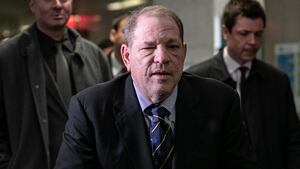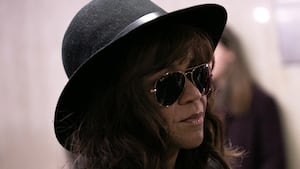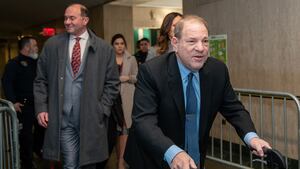Harvey Weinstein’s defense lawyer, a self-described “ultimate feminist,” proudly said Friday she has never been a victim of sexual assault—because she would never put herself “in that position.”
Donna Rotunno, who is representing Weinstein at his sex-crimes trial in New York, made the victim-shaming claim toward the end of a wide-ranging interview with The New York Times podcast The Daily.
When reporter Megan Twohey asked if she’d ever experienced a sexual assault, Rotunno replied, “I have not.” She then paused before adding, “Because I would never put myself in that position.”
“So you’re saying, I’m sorry, so you’re saying that you have never been sexually assaulted because you would never put yourself in the position of being sexually assaulted?” Twohey responded, shocked by her answer.
“No, I’ve always made choices from college-age on where I never drank too much, I never went home with someone I didn’t know, I just never put myself in any vulnerable circumstance,” she said. “Ever.”
The shocking statement from the Chicago-based lawyer, who has built her career defending men accused of sexual assault, comes one day after Weinstein’s legal team kicked off its defense in Manhattan Supreme Court.
Weinstein, 67, has pleaded not guilty to five charges, including predatory sexual assault and first-degree rape, for allegedly sexually assaulting Miriam Haleyi inside his SoHo apartment in 2006 and raping Jessica Mann in 2013 inside a New York hotel room.
The prosecution rested its case Thursday after calling 27 witnesses over two weeks—including six women who graphically detailed to jurors their alleged sexual assaults and how they kept silent, fearing career ruin and embarrassment.
All of the women claimed Weinstein lured them into isolated places under the guise of professional conversation. Once alone, he sexually assaulted them, sometimes justifying the act by complimenting them or insisting “this is how all actresses make it,” they testified.
Twohey pressed Rotunno further about her accusations, asking if she believes every woman who has been sexually assaulted “somehow put themselves in that position, whether it was having drinks or agreeing to go to a hotel room?”
Quickly backpedaling, Rotunno answered, “Absolutely not. But just as we make smart decisions when we walk out on the street at night, I think you have to make the same decision when you’re putting yourself in circumstances with other people.”
“All I’m saying is that women should take precautions,” she added.
While Weinstein’s legal strategy hinges on the argument that these women had consensual sex with the producer for career gain, legal notes obtained by the Times show he’s admitted to being confused by the concept of consent.
The notes, written down by a lawyer in 1998, were reportedly made when Weinstein was trying to arrange a settlement with two former Miramax assistants to end allegations he had sexually assaulted one of them.
“I truly apologize for the pain I’ve caused you,” Weinstein allegedly said, according to the note. “Things [are] confusing for me too. You may not believe that. Sometimes don’t know when it’s consensual. Trying to learn. Maybe I don’t recognize my power in these situations.”
On Thursday, former talent agent Paul Feldsher also testified about Weinstein’s known “voracious appetite” for sex, justifying it by claiming his “friend” was a sex addict.
“It was my understanding that Harvey had a sex addiction for a long time,” he told jurors.
Feldsher was called to testify as the defense’s first witness to speak about his close relationship with Sopranos actress Annabella Sciorra—who alleges Weinstein raped her in 1993 and 1994 inside her New York apartment.
According to Feldsher, however, the violent assault was not as visibly traumatic or “stressful” as she claimed on the witness stand. He recalled a conversation with the actress in the ’90s in which she allegedly admitted she’d “done this crazy thing with Harvey.”
“As I understand it all these years later, there was nothing that she told me that was shocking or alarming, there was nothing stressful. My understanding was that she fooled around with him,” said Feldsher.
On Friday, after the defense called a memory expert and a forensic document examiner to the stand, Assistant District Attorney Joan Illuzzi slammed Rotunno for her New York Times interview and asked Justice Judge Burke to “order to the defense to cease and desist from speaking with the media.”
“She’s calling our witnesses liars and celebrity victim-hood status,” Illuzzi added.
“Judge, I have not spoken to anyone in media since we started this case, that was taped a while ago. I had no idea it was going to be broadcast,” Rotunno responded. “I got called this morning, a friend of mine heard it.”
A spokesperson for The New York Times, however, told Buzzfeed that the interview was in fact recorded on Jan. 28—six days into the trial—and Rotunno knew the interview was scheduled to air on Friday. Rotunno did not immediately respond to The Daily Beast’s request for comment.








